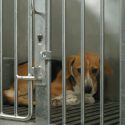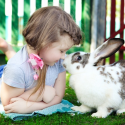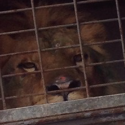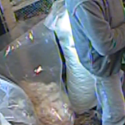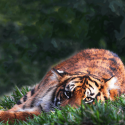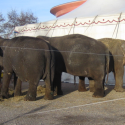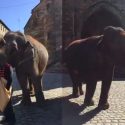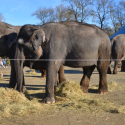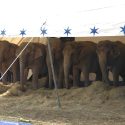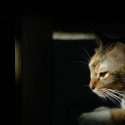Again more and more dogs are being supplied to the labs … Let’s close down the breeding farm instead of enlarging it!
Again more and more dogs are being supplied to the labs … Let’s close down the breeding farm instead of enlarging it!
19.04.2018
Mézilles
Again more and more dogs are being supplied to the labs … Let’s close down the breeding farm instead of enlarging it!
Animal testing
A laboratory dog breeding farm that we follow closely is today trying to legalize its expansion. Breeders are waiting for the government to relax the number of dogs allowed. We are asking the Prefect for the closure of this farm. Animal experimentation must diminish, and not increase, as we still see sadly. It is the alternative methods that must be encouraged!
Breeding and experimentation is the cause of suffering upon suffering.
The breeding of dogs in Mézilles in the department of Yonne provides dogs for laboratories. To our knowledge, and according to available figures, it is the largest breeder of this type in France.
In this place, up to 500 Beagle and Golden Retriever females are put through an endless breeding program for many years. Their little ones are torn away from them to undergo experiments. And once these breeding females are sick or too old, they are also sold off alive or slaughtered and then sold in pieces, exploited even in death.
But these are sentient beings that live there! For the overwhelming majority, they are the dogs that see the light of day … the day light that they will see is still after all too short!
Whether in the breeding program or in the laboratories, the place of life for these gentle beings is a place of detention where no consideration of their well-being is spared. Here there is little comfort, no attention is paid or caresses given, crammed into courtyards or in cold boxes.
Several times a week without respite, specially chartered vans take them from the farm to the laboratory benches, and to their « animal house ». These particularly social dogs are then separated from their companions, sisters and brothers. Once there, they are often locked in tiled pens, they will no longer see the sky, and will undergo tests until death takes over some of them.
Some may even be fattened up, made obese to better test bariatric surgery techniques. Others may have broken bones, for the study of prosthetics, females may undergo abortions and forced caesarean to dissect the pancreas of their puppies…
If experimental dogs live the worst of the ordeal, then what of other animals?
In France, dogs are among the most protected animals of all, thanks to their status as pets. However, laboratories are using them increasingly more to experiment with toxic, irritating, dangerous products, to test new surgical techniques, or to dissect parts of their bodies. European law stipulates that the use of animals for animal experiments must be reduced, refined, and replaced (the 3Rs) by alternative methods, such as computer simulations, cross-referencing the results of other past experiments, or even in vitro stem cell experimentation… However, these methods struggle to impose themselves as they should. Researchers do not invest enough in their development, even as the evidence accumulates on the certain obsolete protocols and health scandals related to drugs tested on animals (as for example, the drug Mediator).
So if the Beagle and Golden Retriever dog, that is so gentle, so cooperating and loving towards humans, are bred and used in increasing numbers to undergo often cruel treatment in the hands of scientists, what then for animals lesser protected by the law, such as monkeys, rabbits, rats, mice, guinea pigs and hamsters…?
Where are they taken? Who are these laboratories that « consume » dogs in such great quantities?
A political will must assert itself!
A request for regularization that questions
Last September, we met the chief of staff of the prefect of Yonne. We had presented our report on the beagles and asked them to consider our request to close the breeding programs. It is not by perpetuating and expanding the fostering capacity that we will see the end of animal testing.
The notice published mentions the size of the facilities, the evacuation of the fluids, in appearance, just the technique. But looking closer…
In Mézilles, the inspection counted more than 1500 dogs including 1300 over 4 months old, while the authorization is only for 500 adult bitches. Breeding, which does not seem to meet the standards, would therefore require a regularization of the previous authorization. Fifteen years ago we had investigated this farm, and then we handed over 350,000 signatures to the Ministry of Research to demand the ban on experiments on dogs and cats.
Will the state still decide in favour of the powerful animal experimentation lobby or will it finally take stock of the issue of animal suffering, and stop maintaining an out-dated system?
Actions taken by One Voice
The notice of inquiry was published on March 23th 2018, for 30 days. On April 18th 6 days before the close, there was still no public comment in the investigation registry. Maybe they hoped to go unnoticed…
We urge you to write before April 24th to enquete-publique-649@registre-dematerialise.fr against the expansion of this breeding program of dogs dedicated to animal experimentation!
We wrote all our technical objections to the investigator on the application for regularization of the breeding program, and write to the Prefect. If the suffering of dogs intended for animal testing does not affect the hearts of the authorities, we hope that they will hear at least our arguments concerning the risks and impact on the environment due to the large concentration of dogs.
We are also calling for a big gathering in front of the Yonne Prefecture in Auxerre on June 9th at 2 pm, and we invite you to sign the petition that we will give to the Prefect. For all the experimental dogs and animals, thank you for your mobilization!
